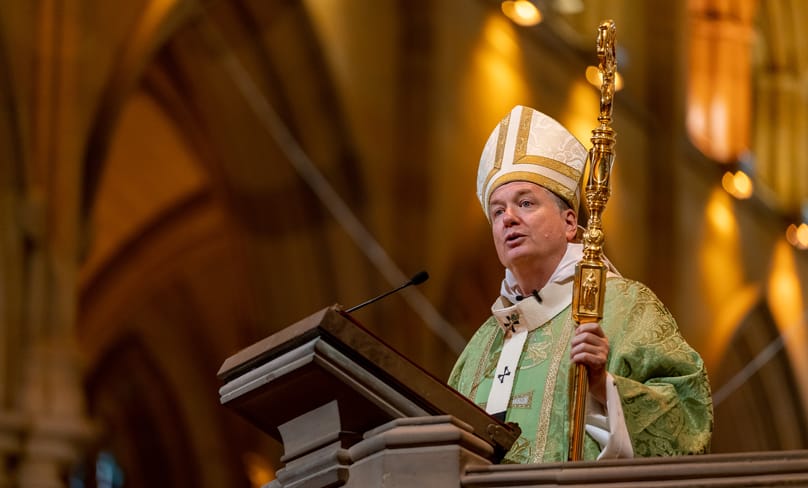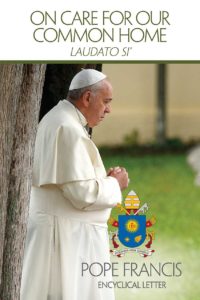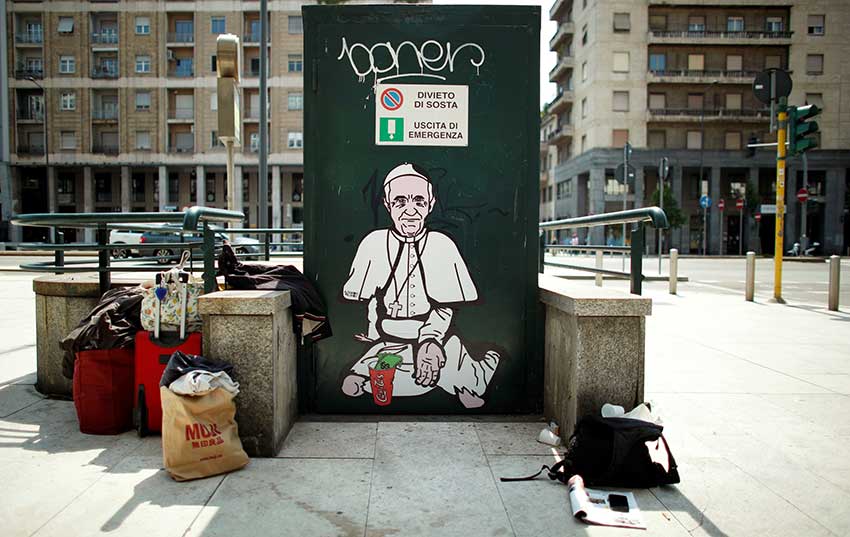Australian theologian Neil Ormerod launched a remarkable attack against Archbishop Anthony Fisher OP over Pope Francis’s encyclical Laudato Si’. It left many Catholics scratching their heads …

“Has the Australian Church heeded the call of Laudato Si’?”
A complex subject! As Neil Ormerod suggests in his recent article, a plethora of different empirical or scholarly barometers might be used to try and adequately answer this question. The complexity is intensified by the theological-canonical qualification that “there is nothing that can properly be described as ‘the Australian Catholic Church.’”[1] Thus, in the once “strictly-confidential” (now conveniently leaked) review of Church governance, Light from the Southern Cross, considerable effort was made to refine our language about the Church so as to be more encompassing and inclusive. To move away from a “rigidly hierarchical worldview” in order to “embrace synodality” so that our understanding of the “Australian Church” will better reflect the “experience of all members”; rather than focusing solely upon the practices and performance of a few, all-male, hierarchs.[2]
A missed opportunity

Alas, sadly, Prof Ormerod’s decision to adjudge whether or not the “Australian Church” has heeded Pope Francis’ call for an “ecological conversion” by counting the number of references to Laudato Si in Archbishop Anthony Fisher’s talks and homilies only perpetuates this hierarchical model. This is especially tragic given that the subtitle of the encyclical itself emphasises the encompassing and inclusive nature of its message: “On Care for our Common Home.” It is equally tragic that not a single reference is made to the powerful and proliferating responses to Laudato Si found amongst lay-leaders in Catholic schools, hospitals, parishes, and other diocesan agencies. What a wonderful opportunity it would have been to reflect socially, culturally, and theologically upon how this ‘common care’ might become an illustrative paradigm for how lay people can exercise “co-responsibility” in shaping Church governance. A missed opportunity, indeed.
A case based on … footnotes?
Yet, one still has cause to wonder. Why evaluate the level of climate-faith and the rate of ecological-conversion in the “Australian Church” by restricting one’s analysis to Archbishop Fisher’s footnotes alone? Perhaps Prof Ormerod is merely re-narrating Ignatius of Antioch’s dictum to mean that ‘wherever Pell and his purported protégé are, there is the Australian Church?’ Or, is he perhaps doing the very thing he accuses Archbishop Fisher of doing — namely, of building an ideological “moat” around the Archbishop for the sake of promoting an “unsaid” politico-ideological agenda? In other words, is the invocation of Laudato Si actually a tactical legerdemain to try and undermine, albeit shrewdly, the synodal process by trying to eschew the Archbishop’s commentary on the Governance Review and the Plenary Council — of which in both Ormerod has a vested interest?

In Australia, it all depends on one bishop – apparently
As intimated, the article begins promisingly by suggesting that “we should also pause to look back to examine what level of uptake the encyclical has had in the Australian Catholic Church. Has the Church taken the document into its heart?” But rather than inviting his readers to engage in a synodal-like process of mutual self-reflection as “Church”, the attention is immediately placed upon the literary “output” of one lone prelate. Thus, Prof Ormerod’s preference for a hierarchical over a synodal methodology is compounded since it gives the impression that the only “heart” worth considering in Australia is Archbishop Fisher’s!
Not just conversion on environment
The reason Prof Ormerod gives for this is that Archbishop Fisher’s talks and homilies are readily available online and are in “searchable form”. In other words, it is a convenient and pragmatic barometer. However, even this hermeneutical attraction to pragmatism betrays something fundamental about the intensely spiritual nature of Laudato Si. In the words of the Oxford theologian, James Hanvey, Laudato Si is “clearly motivated by more than pragmatic concerns for the survival of the planet and the life it supports.”[3] Instead, it “asks for an intellectual, moral, social and spiritual conversion.”[4] To think, therefore, that such a critical and complex issue can be measured by a ‘google-search’ suggests that the sincerity of one’s ecological conversion can potentially be equated with ecological virtue signalling or Laudato Si ‘name-dropping’.

Moreover, why limit your ‘google-search’ to just the title of the encyclical? Surely, to have taken the “document to heart” does not necessarily mean we have to refer to it by name in every instance. Thus, when Prof Ormerod laments that Archbishop Fisher seems never to refer to “the multiple specifics Francis identifies in his encyclical” and lists “global inequality, and poverty-driving degradation”, as examples, a simple ‘google-search’ of his talks and homilies would have revealed that they are actually replete with references to such matters.
Another agenda?
But one really becomes suspicious of an underlying ideological “unsaid” at the denouement of the article whence the hermeneutical justification for measuring climate-faith by Archbishop Fisher’s footnotes alone is seemingly undone. In the second last paragraph, Prof Ormerod discloses that he has also performed other ‘google-searches’ in order to discern the “hearts” of other prelates. For instance, he writes that “Brisbane’s and Perth’s websites are replete with references to the encyclical…” Was this the “best kept secret” we were waiting for — that after focusing solely upon Sydney because its website has a convenient search function, it turns out that the Archdioceses of Brisbane and Perth also have a search function on their websites? Praise the Lord!

First impressions: churlish at best, antagonistic at worst
All this notwithstanding, the principle issue I have with Prof Ormerod’s piece is that it is churlish at best and antagonistic at worst to “single out Sydney” on an issue that Pope Francis clearly directed to us all. Articles such as Prof Ormerod’s create an unfortunate moat between the Church in Sydney and the Church in Australia. A more balanced and scholarly approach would have been to incorporate a greater variety of different social, cultural, and even economic indicators. Examining one Archbishop’s talks and homilies might be an indicator, but it can hardly be the only indicator for an article that is titled, “Has the Australian Church heeded the call of Laudato Si?”

Is this really about Laudato Si’?
Wouldn’t a more fulsome approach have been to do as the Governance report encourages — to “consult and listen… before making decisions” about, in this instance, either the state of the Archbishop’s ecological heart or the ecological heart of Australian Catholicism?[5] Did Prof Ormerod even try to enter into a listening session with Archbishop Fisher about this? Although this wouldn’t come up in google, I recently heard of how Archbishop Fisher encouraged a younger, notoriously “conservative”, priest to keep driving a more environmentally friendly Toyota Prius and to take public transport where possible. Such examples are missed by Ormerod’s ‘google-search’ hermeneutic. Hence, my supposition that this article is not so much about Laudato Si as it is about launching a clandestine attack on an Archbishop that is faithful to the magisterium.

One final observation. Prof Ormerod and Archbishop Fisher are both theologians. Laudato Si is, by its very nature, a profoundly theological document. Whereas Archbishop Fisher rightly treats it as such by trying to balance and inter-relate true ‘climate action’ with ‘spiritual conversion’, Prof Ormerod appears to discount the ‘spiritual’ by emphasising its “secular” character. The issue with this is that, even by continuing to use the language of the “secular” (a fragmented term which naturally introduces an unhelpfully dualistic worldview), he continues to create a moat between the Church and the world; between theology and science; between Catholicism and environmentalism. It may thus be useful for Prof Ormerod to pause and read the recent review of Church governance and heed its call for a more inclusive, encompassing, synodal, and dialogical language.
Neither Cardinal George Pell nor Archbishop Anthony Fisher OP are synonymous with the “Australian Church” and great injustice is done to the lay-faithful and to the other clergy by suggesting they are – especially on a matter as complex as climate-change!
[1] Implementation Advisory Group and the Governance Review Project Team (IAGGRPT), The Light from the Southern Cross”, p.34.
[2] Ibid., p.64, p.43.
[3] James Hanvey, “Laudato Si and the Renewal of Theologies of Creation”, The Heythrop Journal, LIX (2018), 1023.
[4] Ibid., 1023.
[5] IAGGRPT, The Light from the Southern Cross, 29.
Related
